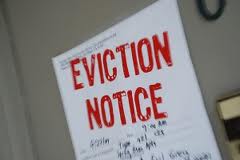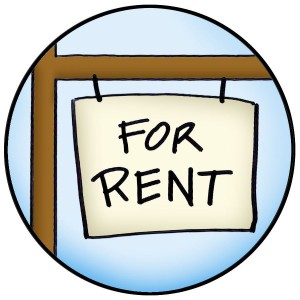I recently did my first tenant eviction. It’s something I always felt a little queasy about doing, since the procedure was kind of hazy to me. But I found the whole process fairly easy.
Contrary to widespread misconceptions, the justice system favors the landlord. If a tenant violates the contract, the law is on the side of the landlord. And, not having enough money is an unacceptable reason not to pay the rent.
I had a tenant that had a habit of paying late. I warned him that this can’t continue, yet after the warning he I still didn’t receive his payment on the due date – the first day of the month.
Here are the steps that I took to remove him:
1.) I filled out a “Pay or Quit” form that gave him 5 days to pay up or remove himself from the premises. I taped it to the front door and mail a copy to tenant. I made a copy of this form from my copy of the Arizona Landlord’s Deskbook.
2. ) He didn’t pay or leave so I went to the County Courthouse and filled out a form to set a court date to have him evicted. I paid $42 to process the paperwork and $40 to the County Constable to hand deliver the Eviction Summons to the tenants. The Summons named the tenant as defendant, stated the date and time of the trail, and listed the amount of money they owed. It took one week before we could get a trial date.
3.) At the trial, my wife and I show up, but the tenants do not. The judge awards the judgement to my wife and I and gives us a paper ordering the tenants to  leave and to pay the costs, which includes an additional $85 for Court Costs. The Judge’s Eviction Notice gives the tenant 5 more days to get out.
leave and to pay the costs, which includes an additional $85 for Court Costs. The Judge’s Eviction Notice gives the tenant 5 more days to get out.
4.) We mail a copy of the verdict to the tenant and he is out before the 5 days is up. We don’t anticipate getting the last month’s rent, but our main goal was to remove them from the premises.
The entire process is simple enough that it can be done without a lawyer. However, in the court I saw one tenant who had hired a lawyer to represent her. The rest of the landlords that I saw did not have lawyers.
My only regret was that I waited longer then I should have to file the paperwork with the county. I negotiated with the tenant, which turned out to be futile. It wound up taking about a month to actually remove the tenant. Had I acted quicker, he could have been out in half the time.
Overall, going through the process was empowering because it gave me confidence that the government is there to assist landlords to remove problem tenants.
Excuses for not paying rent
I have found that tenants can afford to pay for cable TV, new Ipods, big screen televisions, yet they can’t afford to pay the rent. I often think to myself, “Something is wrong with this picture.”
Here are some sad but true excuses that tenants have come up with (from The Landlord Protection Agency at http://www.thelpa.com). If you hear excuses like these, it’s probably time to start the eviction process.
 “I had to pay my car registration & I owed my former landlord money.”
“I had to pay my car registration & I owed my former landlord money.”
“Oh come on. You’re gonna harass me on Valentines Day?”
“We are expecting a couch delivery in the next few days.”
“You know with Christmas gifts and parties, we’re a little short on the rent this month.”
“My last landlord had no problem with me paying late. This seems to be a real big issue with you.”
“Sorry I said I would have the rent and the late fee. I lied. So where do we go from here?”
“I would have paid the rent, but I though I needed it more than you.”
“So many things came up this month that I had to deal with. Now I don’t have the rent money. Sorry. I don’t know what to do. I’m sure not gonna borrow it.”
“I lost my cell phone with your number in it. That is why I couldn’t call you to tell you what happened!”
“We had to use the rent to pay our electric bill. They were gonna turn us off if we didn’t pay the whole bill.”
“Why you bothering me? I told you I work 2 jobs and don’t have time for this!”
“I would have paid your rent, , but I had to make the car payment.”
“I did not pay the rent when I said I could because that is the only day I can sleep late.”










